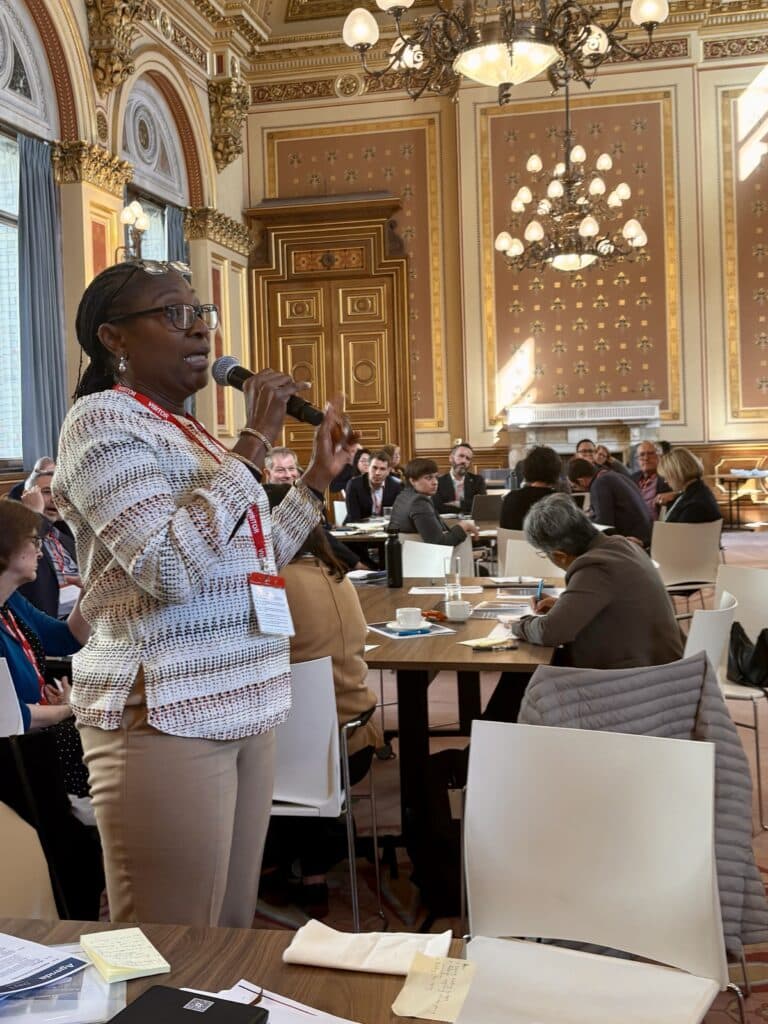
Transport systems are the lifelines of modern economies and societies, yet they’re also major contributors to inequality, pollution, and climate change. As the world stumbles to meet the Sustainable Development Goals (SDGs), the UN Decade of Sustainable Transport offers a timely and powerful opportunity to transform mobility for good. The decade was announced in December 2023 by the UN General assembly and is currently being prepared through stakeholder consultations.
The decade represents a crucial window to unite nations behind the goal of sustainable transport — with regulations, investments, and innovation paving the way to inclusive and resilient transport systems. Shared international indicators are essential to guide and track progress, giving countries a compass to steer their policies in the right direction.
The German Development Cooperation (GIZ) is welcoming the decade as we are actively supporting governments and experts to advance sustainable transport agendas. Transport is an important enabler for sustainable development as it affects access to education, jobs, healthcare, but also pollutes the air, is a major emitter of greenhouse gases and road crashes are a major concern for societies across the globe.
Launching in 2026, the UN International Decade of Sustainable Transport (2026–2035) is a global call to action. Its aim is to anchor sustainable mobility as a cornerstone of development and the achievement of the SDGs, by making transport systems more equitable, energy-efficient, and climate-friendly.
Preparations are already underway. Consultations with governments, civil society, and the private sector are feeding into the formation of a comprehensive Implementation Plan, spearheaded by the United Nations Department of Economic and Social Affairs (UN DESA). The plan is set to be launched on November 26, 2025, aligning with the annual World Sustainable Transport Day.
Early dialogue — including a multi-stakeholder workshop in London facilitated by the British FCDO, the Canadian IDRC and the Partnership for Sustainable Low Carbon Transport (SLOCAT) — has outlined three priority areas: resilient economic growth leading to decent jobs, safe and affordable mobility providing access for everybody, and environmental and climate protection. The SLOCAT Partnership has published an input paper on these consultations already in late 2024. And is now working on summarising the input to a more specific roadmap. Nevertheless, the discussions so far are rather generic and still very broad. It would require more specific targets and indicators to make it operational.
At GIZ we hope that the UN Decade of Sustainable Transport becomes more than just a vision. As we work closely with partner countries on specific challenges such as walkability in cities, facilitating freight in regional economic corridors or electrifying vehicle fleets we see a need to make the decade relevant for countries and cities. It would make a real difference, if national governments translate the objectives of the decade into national actions. This means defining clear goals, shaping measurable outcomes – based on smart indicators – and implementing effective policy frameworks.
To create genuine momentum, the decade would have to inspire every country to develop its own national roadmap aligned with the decade’s global objectives. This includes for example setting emissions reduction targets, boosting infrastructure for walking, cycling, and public transport, investing in sustainable freight options and developing frameworks to boost e-mobility.
Intl. donors would then be able to connect to those plans and provide support such as: capacity-building, and financial and technical assistance to bridge the gap between intention and implementation. At global level, sharing data and experiences can then further boost peer learning. It would therefore be a key success factor to define appropriate indicators.
The UN Decade of Action for Road Safety (2011–2020) showed how international frameworks can inspire national reforms. Countries like Namibia used the platform to develop tailored road safety strategies, aligning with global goals while addressing local challenges.
The Namibian Road Safety Council (NRSC) effectively used the global momentum of the Decade of Action for Road Safety to engage national stakeholders and attract international support for its road safety agenda. This led to the development of a governance framework and KPIs now applied across government institutions.
The initiative helped raise political awareness of road fatalities and anchored Vision Zero in national strategies. Namibia also improved crash data systems, launched public campaigns like #Stand, and strengthened coordination across sectors.
In recognition of these efforts, Namibia received the Kofi Annan Road Safety Award in 2021, affirming its role as a regional leader in road safety.
With just over a year until the official launch, momentum is building. Finalising the Implementation Plan, incorporating insights from global workshops, and rallying support across sectors are all vital next steps and UN DESA, the regional UN commissions and SLOCAT are working to make this a success. There will be several further consultations, the next during the ITF Summit in Leipzig, Germany. By November 26, 2025, the decade will be launched. Implementation will then start in 2026. If it will be a success will only be known a few years later. GIZ is ready to include the decade in its running programmes, if partner countries think it’s useful and want to build their national implementation plans and programmes. Hence, key success factors will be clear indicators and targets relevant for the countries, more and better sharing of data within and across countries.
.
We hope that this will happen as the 10 years of the decade are not only a critical time for achieving the SDGs but also for achieving the Paris Agreement. As the Decade of Sustainable Transport approaches, the global community faces a critical choice: maintain the status quo or boldly reimagine mobility. If successful, the decade can be a major milestone in presenting better transport systems as an enable for sustainable development.
You are currently viewing a placeholder content from X. To access the actual content, click the button below. Please note that doing so will share data with third-party providers.
More Information